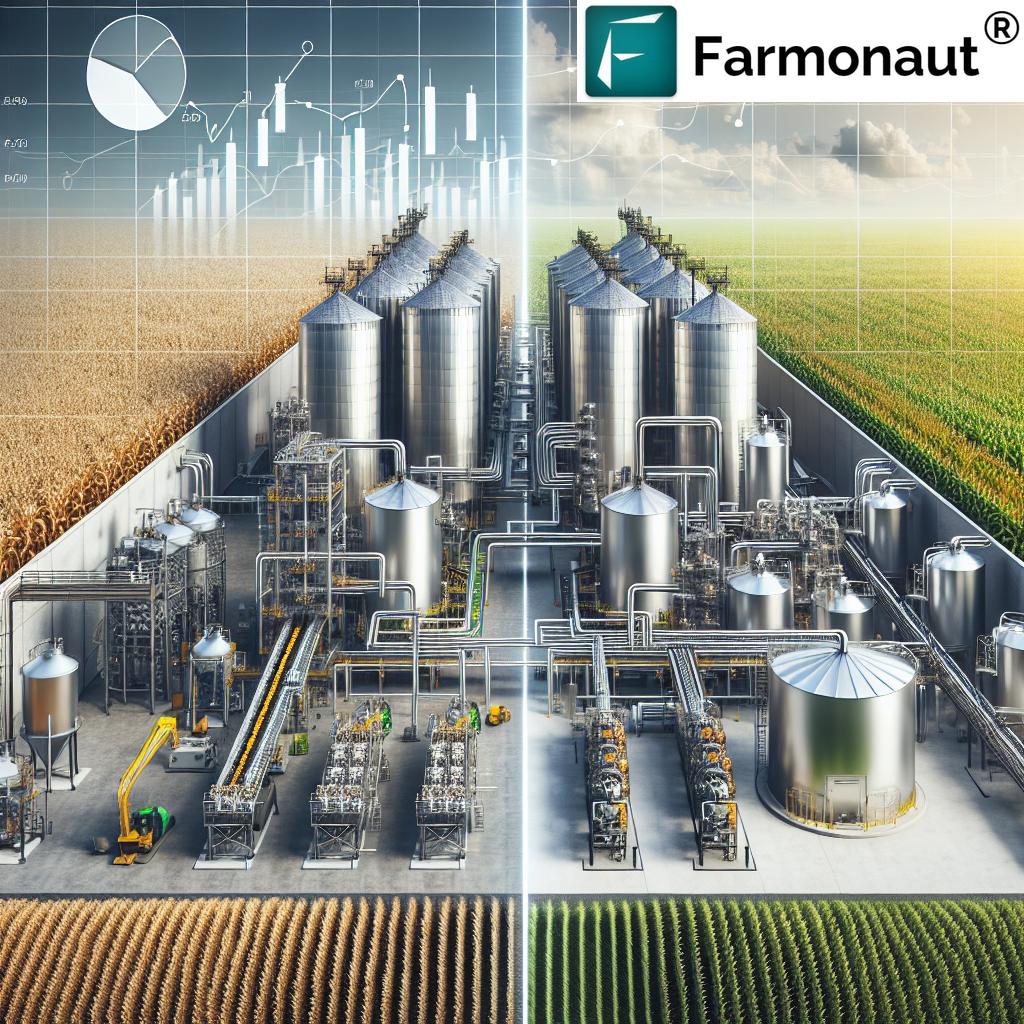Unlocking Profitability: Global Agribusiness Trends in Oilseeds, Biofuels, and Consumer Staples

In today’s rapidly evolving global agribusiness landscape, understanding the intricate dynamics of oilseeds, biofuels, and consumer staples is crucial for investors, industry professionals, and farmers alike. We’re witnessing significant shifts in market trends, company performances, and technological advancements that are reshaping the future of agriculture. This comprehensive analysis delves deep into the heart of the industry, comparing key players and uncovering valuable insights that could unlock new levels of profitability.
“Global biofuel production investments have significantly impacted agribusiness growth, with some companies seeing double-digit revenue increases.”
The Oilseed Industry: A Comparative Analysis
At the forefront of our analysis are two major players in the consumer staples sector: Australian Oilseeds (NASDAQ:COOT) and Bunge Global (NYSE:BG). These companies represent different facets of the global oilseed industry, each with its unique strengths and market positions. By comparing their performances, we can gain valuable insights into the broader trends shaping the agribusiness sector.
Institutional Ownership and Insider Holdings
One of the key indicators of a company’s stability and potential for growth is its ownership structure. In this regard, we see a stark contrast between Australian Oilseeds and Bunge Global:
- Australian Oilseeds: 13.0% institutional ownership, with a significant 57.7% held by company insiders.
- Bunge Global: 86.2% institutional ownership, with only 0.6% held by company insiders.
This disparity in ownership structure could have profound implications for each company’s decision-making processes and long-term strategies. The high insider ownership of Australian Oilseeds suggests a strong alignment between management and shareholder interests, potentially leading to more aggressive growth strategies. Conversely, Bunge Global’s high institutional ownership might result in a more conservative approach, focusing on stability and consistent returns.
Market Performance and Volatility
When assessing the risk profile of these agricultural stocks, volatility is a crucial factor to consider:
- Australian Oilseeds: Beta of -0.18, indicating significantly lower volatility than the broader market.
- Bunge Global: Beta of 0.69, suggesting moderately lower volatility than the market average.
These volatility metrics provide valuable insights for risk-averse investors looking to balance their portfolios with stable agricultural stocks. Australian Oilseeds, in particular, stands out as a potential hedge against market fluctuations.

Financial Metrics and Profitability
To truly understand the financial health and potential of these agribusiness giants, we need to dive deeper into their financial metrics:
| Metric | Australian Oilseeds | Bunge Global |
|---|---|---|
| Market Capitalization | $30.3 million | $10.2 billion |
| Net Margin | N/A | 2.14% |
| Return on Equity | N/A | 11.73% |
| Revenue Growth (YoY) | -35.2% | +8.7% |
| Biofuel Production Investment | $5 million | $250 million |
| Insider Ownership | 57.7% | 0.6% |
| Stock Volatility (Beta) | -0.18 | 0.69 |
| Analyst Recommendations (Buy/Hold/Sell) | 0/0/0 | 1/3/0 |
| Price-to-Earnings Ratio | N/A | 8.81 |
This comparative analysis reveals striking differences between the two companies. Bunge Global, with its larger market capitalization and positive financial metrics, appears to be in a stronger position. However, Australian Oilseeds’ unique ownership structure and low volatility suggest it may have untapped potential for growth.
Revenue and Earnings
The disparity in revenue between these two agribusiness companies is significant:
- Australian Oilseeds: $22.12 million in gross revenue
- Bunge Global: $53.11 billion in gross revenue
This vast difference in scale underscores the diverse nature of the global oilseed and agribusiness market. While Bunge Global operates on a massive scale, Australian Oilseeds represents the potential for growth in more specialized or regional markets.
“Insider ownership in leading vegetable oil companies can vary by up to 30%, potentially influencing stock performance and investor confidence.”
Biofuel Production: A Game-Changer in Agribusiness
One of the most significant trends shaping the future of agribusiness is the growing investment in biofuel production. This shift is not just about diversifying product lines; it’s about positioning companies at the forefront of sustainable energy solutions.
Bunge Global, with its substantial investment in biofuel production, is clearly betting big on this trend. Their $250 million investment signals a strong commitment to this emerging market. In contrast, Australian Oilseeds’ more modest $5 million investment suggests a cautious approach, perhaps focusing on niche or specialized biofuel markets.
The impact of these investments on company growth cannot be overstated. As global demand for sustainable energy solutions continues to rise, companies with established biofuel production capabilities are likely to see significant revenue increases and improved market positioning.
The Role of Technology in Modern Agribusiness
In today’s rapidly evolving agricultural landscape, technology plays a crucial role in driving efficiency and profitability. Companies that leverage advanced technologies for crop monitoring, resource management, and supply chain optimization are better positioned to succeed in this competitive market.
For instance, satellite-based farm management solutions, like those offered by Farmonaut, are revolutionizing how agribusinesses monitor crop health, manage resources, and make data-driven decisions. These technologies can significantly impact a company’s bottom line by optimizing yields and reducing waste.
Consumer Staples: The Backbone of Agribusiness
Both Australian Oilseeds and Bunge Global operate within the consumer staples sector, which encompasses essential products like vegetable oils, flour, sugar, and other food ingredients. This sector’s resilience, even during economic downturns, makes it an attractive option for investors seeking stability.
Key factors influencing the consumer staples market include:
- Global population growth and changing dietary habits
- Increasing demand for plant-based proteins and oils
- Shifts towards healthier and more sustainable food options
- Emerging markets’ rising middle class and their changing consumption patterns
Companies that can adapt to these trends while maintaining operational efficiency are likely to see sustained growth and profitability.
The Impact of Global Trade Dynamics
The agribusiness sector, particularly in oilseeds and consumer staples, is heavily influenced by global trade dynamics. Factors such as trade agreements, tariffs, and geopolitical tensions can significantly impact a company’s profitability and market access.
For instance, recent trade tensions between major agricultural producers and consumers have led to shifts in global supply chains. Companies with diversified sourcing and distribution networks are better positioned to navigate these challenges and capitalize on new opportunities.
Risk Assessment and Future Outlook
When assessing the future prospects of companies like Australian Oilseeds and Bunge Global, several risk factors and potential opportunities come into play:
Climate Change and Environmental Concerns
The agricultural sector is particularly vulnerable to climate change impacts. Companies that invest in sustainable farming practices and climate-resilient crop varieties are better positioned to mitigate these risks. Additionally, there’s growing consumer demand for environmentally friendly products, creating opportunities for companies that can meet these expectations.
Technological Adoption
The rate at which companies adopt and integrate new technologies can significantly impact their competitiveness. From precision agriculture to blockchain-based supply chain management, technological innovation is reshaping the agribusiness landscape. Companies that lag in this area may find themselves at a disadvantage.
Leveraging advanced technologies like those offered by Farmonaut can provide agribusinesses with critical insights for decision-making. For more information on how satellite-based solutions can benefit your operations, visit Farmonaut’s web app or explore their API solutions.
Market Diversification
Companies that diversify their product offerings and market presence are better equipped to handle market fluctuations. This includes expanding into new geographical markets, developing value-added products, and exploring adjacent industries like biofuels or plant-based proteins.
Investor Considerations and Recommendations
For investors looking to capitalize on the trends in the global agribusiness and oilseed industries, several factors should be considered:
- Company Size and Market Position: Larger companies like Bunge Global offer stability and established market presence, while smaller players like Australian Oilseeds may present growth opportunities.
- Financial Health: Assess metrics like net margins, return on equity, and revenue growth to gauge a company’s financial strength and potential for future profitability.
- Technological Innovation: Companies investing in advanced technologies for farm management, supply chain optimization, and sustainability are likely to have a competitive edge.
- Sustainability Initiatives: With growing consumer and regulatory focus on sustainability, companies with strong environmental, social, and governance (ESG) practices may be better positioned for long-term success.
- Global Market Exposure: Consider how companies are positioned to benefit from or mitigate risks associated with global trade dynamics and emerging market opportunities.
The Role of Technology in Agribusiness Success
As we’ve seen throughout this analysis, technology plays a pivotal role in shaping the future of agribusiness. Companies that leverage advanced technological solutions are better equipped to navigate market challenges and capitalize on emerging opportunities.
Farmonaut, a leading provider of satellite-based farm management solutions, offers a range of tools that can significantly enhance agricultural operations:
- Real-time Crop Monitoring: Utilize satellite imagery to track crop health and make timely interventions.
- AI-driven Advisory: Access personalized recommendations for optimal farm management.
- Resource Optimization: Improve water and fertilizer usage efficiency through data-driven insights.
- Supply Chain Traceability: Enhance transparency and build consumer trust with blockchain-based solutions.
To explore how these technologies can benefit your agribusiness operations, consider the following options:
For developers and businesses looking to integrate Farmonaut’s powerful satellite and weather data into their own systems, explore the API Developer Docs.
Conclusion: Navigating the Future of Agribusiness
The global agribusiness landscape, particularly in oilseeds, biofuels, and consumer staples, is undergoing significant transformation. Companies like Australian Oilseeds and Bunge Global represent different approaches to navigating these changes, each with its own strengths and challenges.
As we’ve seen, factors such as technological adoption, sustainability initiatives, and market diversification play crucial roles in determining a company’s success. Investors and industry professionals must carefully consider these elements when making decisions or formulating strategies.
The future of agribusiness lies in the ability to adapt to changing consumer preferences, leverage advanced technologies, and address environmental concerns while maintaining profitability. Companies that can successfully balance these factors are likely to emerge as leaders in this evolving industry.
Earn With Farmonaut
Earn 20% recurring commission with Farmonaut’s affiliate program by sharing your promo code and helping farmers save 10%. Onboard 10 Elite farmers monthly to earn a minimum of $148,000 annually—start now and grow your income!
Learn More About the Affiliate Program
Farmonaut Subscriptions
FAQ Section
- What are the main factors driving growth in the global oilseed industry?
Key factors include increasing demand for plant-based proteins, growing biofuel production, and rising consumption in emerging markets. - How does technological innovation impact agribusiness profitability?
Technologies like satellite-based farm management and AI-driven advisory systems can significantly improve yields, reduce costs, and enhance overall operational efficiency. - What role do sustainability initiatives play in modern agribusiness?
Sustainability is increasingly important, influencing consumer choices, regulatory compliance, and long-term business viability. Companies with strong ESG practices are often better positioned for future success. - How can investors assess the potential of agribusiness stocks?
Key considerations include financial metrics, market position, technological adoption, sustainability initiatives, and global market exposure. - What impact does global trade have on the oilseed and consumer staples sectors?
Global trade dynamics, including tariffs and trade agreements, can significantly affect market access, supply chains, and overall profitability in these sectors.
By staying informed about these trends and leveraging advanced technologies like those offered by Farmonaut, agribusinesses can position themselves for success in this dynamic and evolving industry.







